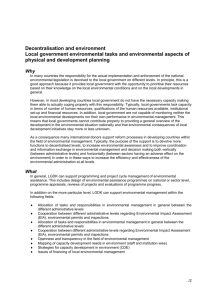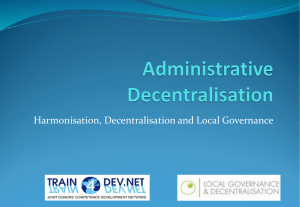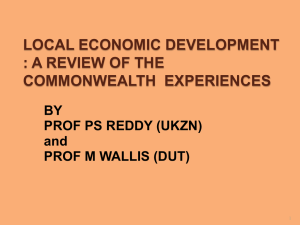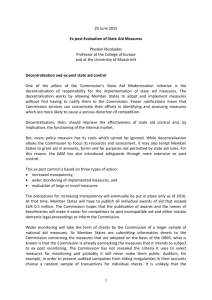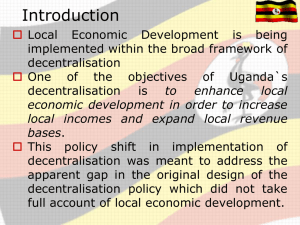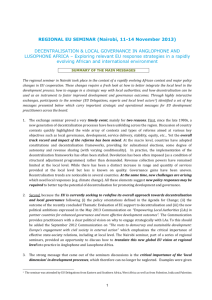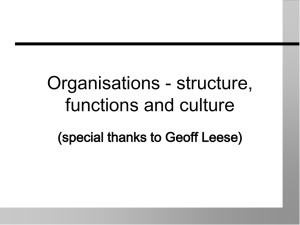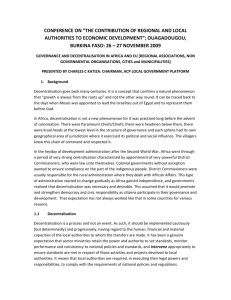A synthesis of the email debate on
advertisement
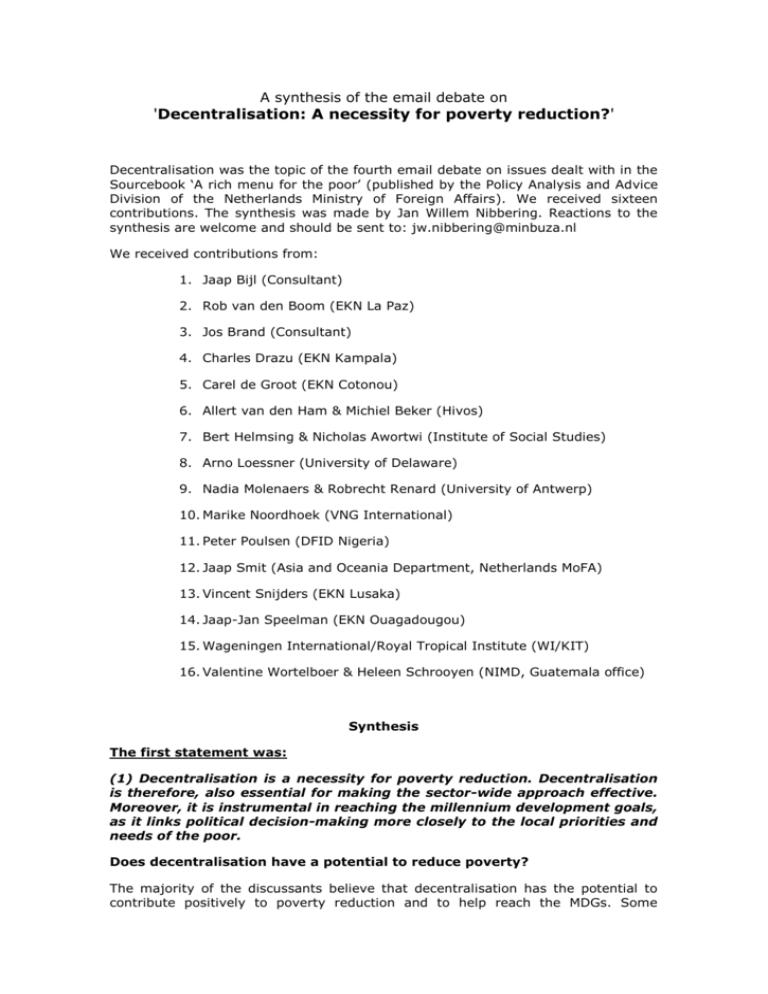
A synthesis of the email debate on 'Decentralisation: A necessity for poverty reduction?' Decentralisation was the topic of the fourth email debate on issues dealt with in the Sourcebook ‘A rich menu for the poor’ (published by the Policy Analysis and Advice Division of the Netherlands Ministry of Foreign Affairs). We received sixteen contributions. The synthesis was made by Jan Willem Nibbering. Reactions to the synthesis are welcome and should be sent to: jw.nibbering@minbuza.nl We received contributions from: 1. Jaap Bijl (Consultant) 2. Rob van den Boom (EKN La Paz) 3. Jos Brand (Consultant) 4. Charles Drazu (EKN Kampala) 5. Carel de Groot (EKN Cotonou) 6. Allert van den Ham & Michiel Beker (Hivos) 7. Bert Helmsing & Nicholas Awortwi (Institute of Social Studies) 8. Arno Loessner (University of Delaware) 9. Nadia Molenaers & Robrecht Renard (University of Antwerp) 10. Marike Noordhoek (VNG International) 11. Peter Poulsen (DFID Nigeria) 12. Jaap Smit (Asia and Oceania Department, Netherlands MoFA) 13. Vincent Snijders (EKN Lusaka) 14. Jaap-Jan Speelman (EKN Ouagadougou) 15. Wageningen International/Royal Tropical Institute (WI/KIT) 16. Valentine Wortelboer & Heleen Schrooyen (NIMD, Guatemala office) Synthesis The first statement was: (1) Decentralisation is a necessity for poverty reduction. Decentralisation is therefore, also essential for making the sector-wide approach effective. Moreover, it is instrumental in reaching the millennium development goals, as it links political decision-making more closely to the local priorities and needs of the poor. Does decentralisation have a potential to reduce poverty? The majority of the discussants believe that decentralisation has the potential to contribute positively to poverty reduction and to help reach the MDGs. Some believe that complete decentralisation is needed to achieve this (WI/KIT). Van den Boom points out, however, that next to decentralisation local governance as such should get far more attention and support in order to reach effective poverty reduction, while adding that DGIS should strengthen its capacity on governance, institutional and capacity development, and pay far more attention to local governance processes as one of the key factors for effective poverty reduction. In his opinion, this will be a strong contribution to modernisation of development cooperation. Smit, while acknowledging that decentralisation can contribute to reaching the MDGs, stresses that it is too far fetched to suggest that it is the instrument to achieve the MDGs. WI/KIT mentions the following reasons for the potential of decentralisation to help reduce poverty: people at the local level know best their problems and needs and should manage their own affairs; it strengthens ownership if activities are selected and implemented by local actors; through decentralisation (poor) citizens finally have access to channels to voice their concerns through the representation of elected councillors (WI/KIT). According to Speelman, poverty can be tackled more effectively because of effective social control on political decision making and local needs. Helmsing & Awortwi put it like this: in contrast with failing rigid nation-wide development models decentralised governance can effectively address the gap between the state’s developmental intentions and local realities. The centralised approach may have shown economic successes in some countries but its weakness is that poverty is not only about lack of income, employment and access to basic services, but also about people’s right to be part of decision making, planning and implementation issues that concerns their lives. Along a similar line, WI/KIT agrees that decentralisation may contribute to the achievement of the MDGs, but more importantly, it strengthens participatory governance, human dignity, empowerment, confidence and self-respect. Many discussants point out, however, that for decentralisation to contribute effectively to poverty reduction, it should be implemented in a proper way. Its effectiveness very much depends on how local government institutions are designed and how actors behave in relation to these institutions (Helmsing & Awortwi). Decision making rights are to be accompanied with a budget, accountabilty mechanisms, and well-developed capacities (Noordhoek). Local government should function in a democratic way, be responsive to local needs, and use participatory processes of policy making (van den Boom). Both Noordhoek en de Groot consider accountability to be essential to decentralisation, and de Groot adds that all local politicians and administrators should be committed, operating in a well-developed system based on accountability, democratic procedures, analyses and receiving full support and guidance from central government. Can decentralisation make the sector wide approach more effective? Four discussants address this question. Bijl points out that a territorial approach needs to complement a (central) sector approach to assure the necessary complementary investments and operation in the other sectors, for instance, access roads needed by people to reach health facilities. Therefore decentralisation is essential to make the sector wide approach more effective and to reach the MDGs as political decisions will be best made in full awareness of inevitable trade-offs resulting from both perspectives. On the demand side effective use of investments and expenditures on operation and maintenance requires politically and technically competent users at the local level. According to Helmsing & Awortwi, the sector wide approach, in itself designed as a centralised programme, can only be made more effective through decentralisation if local government has already been well institutionalised, with local priorities getting room to be formulated. Brand, on the other hand, suggests that is is possible to work on decentralisation and make SWAPs more effective at the same time by creating interactive policy development and monitoring processes among sector stakeholders at all levels. This will then provide experiences which will generate feasible options on how to make decentralisation work in practice. Evidence on effects of decentralisation on poverty Some believe that there is no proof that decentralisation has any effect in reducing poverty (WI/KIT). Drazu observed, however, that decentralisation in Uganda improved service delivery. It enabled local beneficiaries to fully take part in choosing priorities and increased transparency of government action. In his view it made development more effective and efficient. Also Snijders describes how in Zambia administrative decentralisation in the education sector led to major breakthroughs in the provision of class rooms and learning material, but he adds that most studies show little evidence that this process really has an impact on what is happening in the classroom. Others argue that there is evidence showing that without decentralisation economies can grow and poverty can be reduced, in countries like Singapore and China (Helmsing & Awortwi) or, that poverty has declined in the world in the absence of noticeable effective decentralisation (Speelman). Poulsen even believes that decentralisation may have opposite effects. He observes that taking long historical trends into account, rural areas and small towns in the developed world have declined and experienced increased poverty as a result of decentralisation. Capacity development, empowerment and the role of NGOs Some believe that weak capacity at the local level will make it impossible for decentralisation to make any contribution to poverty reduction (WI/KIT). Other discussants are more optimistic stating that it is not impossible, but that it takes time. For local demand to become a true countervailing power to central government, longer term education and public health improvements, among others, are a condition (Brand). Van den Boom is also of the opinion that it may take time for decentralisation to grow through experience, to be embedded and contextualised, requiring institutional and capacity development. This seems to be particularly true in a country like Burkina Faso as is illustrated by Speelman. Here local governance is more conservative, less democratic, less transparent, less educated, less controlled, and institutionally less formally structured than on the central level, and is just as elitist, cynical, opportunistic and corrupt. There is still a long way to go here to realise more local accountability and better service delivery The various contributions to the debate recognize that decentralisation may be prone to elite capture and the exclusion of the poor. The local political arena may not be open to all social groups, especially the powerless (van den Boom). Van den Ham & Beker observe that previously centrally appointed officials used to counterbalance local societal leaders and the other way around. They see strengthening civil society on the local level as a major precondition for effective and democratic decentralised government. Effective organised collective interest groups are hardly present, however. Van den Ham & Beker advocate support for civil society organisations, political parties and media from the national level to the rural levels. They propose a twin approach to rely on self-steering initiatives by citizens and at the same time on NGOs offering opportunities for the emergence of critical mass for social change. Also Bijl favours linking non-state actors to local government as the former can strengthen the competences of the users of delivered services. In his opinion, NGOs can and should strengthen citizen and user capabilities in a rights and duties approach. However, as service providers they do not offer the same accountability potential as elected public bodies do and cannot offer the control functions public service delivery requires. Loessner does see some role for NGOs in service delivery as niche providers, as providers that can function without market incentives and by being net additive to what government offers, because they do not have to focus on keeping the median voter content. When is decentralisation not necessary? According to Loessner it is not necessary for all services to be pushed down to the local level. Economies of scale and political proximity determine the appropriate level for service delivery. Also, the income redistributive power of the central government should be kept intact. De Groot argues that there may be instances where the people at large and the poor in particular are better off having one, but very capable, responsible and accountable, centralised (and/or deconcentrated) national government and administration, than to have a suboptimally functioning or not so very accountable local government. Smit observes that in many countries trends are visible where centralised entities, because of technology, provide quicker and better service than local governments. Health care in many countries is (semi)privatised and local governments have no influence on local schools. Many other activities are subsidised through foundations and NGOs. Many regional or local economic activities are (semi-)private. One should not decentralise for the sake of local politics but because of expected positive effects. In his opinion possible (negative) implications of decentralisation may be: dispersal of resources and manpower, the need to have more and better means of communication/planning/control/HRD and funds, higher transfer costs, increased risks of favouritism, corruption, political turmoil, reduced oversight, and reduced attention for poor people. The second statement was: (2) Giving a mandate and budget to local government are minimum requirements for making local governance successful. A mandate without an adequate budget leads to “make-believe” local government. Mandate and budget are necessary but not sufficient requirements All discussants agree that mandate and budget are necessary requirements for making local governance successful. However, in reality in many countries central governments are not very helpful in getting local government the financial resources they need, because the former have difficulty in ceding power. Deprived of funds, local governments will also have no leverage in dealing with private enterprises and other non-state actors in public-private partnerships and citizens will become despondent about local governments (Helmsing & Awortwi). Noordhoek gives an example of how parents having planned the construction of a school lost confidence in local government for this reason. Mandate and budget are not sufficient requirements, however. Local government should also be democratic, develop constructive working relations with other actors at the local level, and work on economic development (van den Boom). Brand also mentions the need for checks and balances and the need for capacity. Local government should also have full control over its own (local) administration and staff (de Groot). In Drazu’s opinion, for local government to be successful local people need to contribute to local government through taxation and their own time and labour in order to get ownership and foster demand for accountability; there must also be a clear institutional structure for harmonised, coordinated inspection, mentoring, supervision by central government agencies; local government units should not be too small; and local government staff should support nation building and not be concerned about their own districts only. Capacity development & empowerment once more Speelman stresses the point that if other requirements with respect to capacity and accountability are not met fiscal decentralisation may entail great risks. He adds that in Burkina Faso there are still no common strategies that lead to upscalable initiatives to create the necessary capacity and accountability. Central government is still totally occupied with capacity development of its own departments and deconcentrated offices. Donor approaches are still too much project-based and are not realistic as national strategy. Civil society and the for-profit sector could have a key role, but have limited capacity; they are internally divided and compete heavily with one another for ever scarcer funds. It is also not clear how the claim-making power of the population could be strengthened. Bijl points out that donors and NGOs have engrained practices of community approaches to public service delivery implemented by project units and NGOs at national level and tend to fund and support local development completely bypassing local government undermining local democracy and domestic accountability. This is also observed by van den Boom. It also carries the risk of inequity from the national perspective. Donor funding should preferably go to national perennial institutional arrangements, preferably providing local government budget support (Bijl). Even when local government does not receive enough funds from central government, this ‘make believe’ government could still raise its voice and express its demand for fiscal decentralisation (Bijl). In Colombia the first stage in the decentralization process was merely political, which however, created room for local politicians to emerge who could then demand fiscal decentralisation. Only then did administrative decentralisation follow to sort out sectoral disagreements. In many countries decentralisation begins with an over-designed administrative reform and the process stops before political reform has made any serious headway (Helmsing & Awortwi). Room for financial manoeuvring and the need for local revenue In Guatemala, even though the municipal budget is fixed constitutionally at 10% of the national budget, local governments may still have financial problems being faced with reduced space for political manoeuvring in the municipal budget due to inherited debts and a high demand on public expenditures that exceeds the capacity of local government to ‘problem solve’ the existing demands during their term (Wortelboer & Schrooyen) While central government funding may be tight or not forthcoming, many local governments may not have explored sufficiently the possibilities to have their own sources of revenue and prefer to rely on central government grants (Helmsing & Awortwi). According to Loessner, having own source revenues is very important as is having intergovernmental revenue flows that support local decisions on priorities, assuming that there are reasonable standards country wide for income maintenance, education, health, infrastructure, etc. The third statement was: (3) External development partners, like donors and NGO’s, are often indispensable in assisting local authorities to acquire enough leverage visà-vis central government regarding policy and budget. Donors and NGOs should not interfere in local politics A number of discussants outright reject the idea of donors trying to intervene on behalf of local governments. Donors promoting leverage vis-à-vis central government might be considered as getting involved in internal affairs of the state (Smit), which is not appreciated by central governments (WI/KIT). Entering into local politics is not a donor job (Brand). If it is done there should be at least support at central and local political level to make this approach work in order to prevent serious conflicts in the future (Smit). External support from donors is also not sustainable and it will only increase dependency (WI/KIT). It is doomed to fail, because donors can only be there part of the time (Drazu). There is no point in investing and pushing if change is not endogenously driven or cannot be internally supported (WI/KIT). According to Brand, decentralisation, as it is about governance, should follow the principles of alignment and harmonisation. Support by international NGOs to local level civil society is less of a problem in his opinion, but with proper oversight measures. He considers decentralisation as it is practised a top-down process, pushed by donors in which not necessarily the right key ingredients for decentralisation are identified (bottom-up). Donors and NGOs should try to influence the decentralisation process in an indirect manner Some discussants explicitly acknowledge that local governments are often excluded from national policymaking by central government because actors at the central level fear losing their power and interests and want to maintain their position and control (WI/KIT). Helmsing & Awortwi explain that in a decentralised system central governments have to take on new roles. People who used to be decision makers and budget holders are now supposed to act only as conduits for money to the local governments. Speelman observes that centralistic governments with strong prejudices about backward rural areas and a winner takes all mentality will not be inclined to make haste with transfer of means. Local governments on the other hand may be unable to negotiate on their own with central government on an equal footing because they do not have clout and representation capable of defending their roles (Helmsing & Awortwi). Therefore, according to these and other discussants external organisations and donors can help local governments in various indirect ways. According to Speelman, without external advocacy and assistance, decentralisation will not gain momentum. Noordhoek considers developing effective interventions to influence the institutional and political reforms for decentralisation essential and favours an incremental approach based on ‘drivers of change’. External organisations can mobilise politicians in a positive direction and lobby for involvement of local actors (WI/KIT). Donor agencies can help put pressure on central government politicians and bureaucrats to implement some difficult reform policies. Budgetary support can be used to influence the direction of decentralisation policies (Helmsing & Awortwi). But local governments also need to be inspired by external experience and advice (WI/KIT), enriching the debate by infusing best practices from across the world (Drazu). Speelman once more focuses the discussion on the lack of capacity at the local level, which cannot be solved without external assistance. Without the necessary capacities, local government will not be able to negotiate for funds with central government, but he points out that one needs wisdom to be able to distinguish between central governments unjustly considering local governments incapable and the central government’s legitimate caution about the speed of the decentralization process. Donor should give support but with patience. But there are limits to donor influence Discussants are aware of the limits to donor influence. Helmsing & Awortwi tell us that decentralisation is essentially a process from within, which responds to political demands to cope with growing socio-economic problems. If donors exert too much pressure governments may respond by putting up a façade and what they give with one hand in the form of decentralisation reform legislation they take away with the other. In the long run decentralization from outside will not be sustainable. De Groot recognises that external development partners are often indispensable in assisting local authorities, but they should not do it too prominently, otherwise it will be seen as another donor-driven reform, which is not necessarily a good basis for any reform. Local ownership and a solid foundation in local policies and legislation is thus a prerequisite for successful decentralisation. External partners should try to play the role of facilitators rather than levers for change. Molenaers and Renard in their turn raise serious doubts about what donors can achieve to ensure ownership for decentralisation because ownership in partner countries is unstable, fragmented and not predictable. A strategic long term view with a clear set of priorities can be politically dangerous for a politician. If decentralisation is set in place without most of the preconditions and principles being in place, potential winners will resist pressures to weaken it and those that lose out will try to block any further progress. They wonder how donors will deal with these situations, and whether there is a turning back if the decentralisation funding machine is up and running. They conclude that donors must play a far more political and pro-active role than just passively aligning to ownership. But donors have little power and should use it in a clever way. What they could do, is for instance forging coalitions between change agents whereby they could tip the balance in favour of pro-poor reform and support reform minded forces in order to create the right conditions. This means that the pace of reforms should not be dictated by donor agendas. They suggest more administrative decentralisation, combined with mechanisms of accountability, to help the poor in remote areas arguing that political decentralisation can only succeed in institutionalised and competitive regimes. Political decentralisation should not be so high on the donors’ agenda. National associations of local authorities A number of discussants comment on the role of national associations of local authorities in decentralisation processes. Van den Boom states that rather than donors and NGOs trying to influence the central government, municipalities would rather organise themselves in (VNG-like) provincial and/or national associations in order to work together and to strengthen their negotiation position in relation to the relevant national ministries. These national associations can help local governments make claims for resources (Bijl). Noordhoek comments that national associations can serve as valuable counterweights to central authority and, if they receive help from other national associations of local government organisations in other countries they can develop meaningful expertise that can be convincing in parliaments and other policy arenas. Loessner adds that strengthening an association by external assistance from an organisation like VNG International provides it with enough strength to challenge the national government so that they become an acknowledged discussion partner on all issues related to decentralisation. National associations in the North can also help establish and provide funding for a network of associations in a particular region for interchange on how to deal with central government (Noordhoek).
